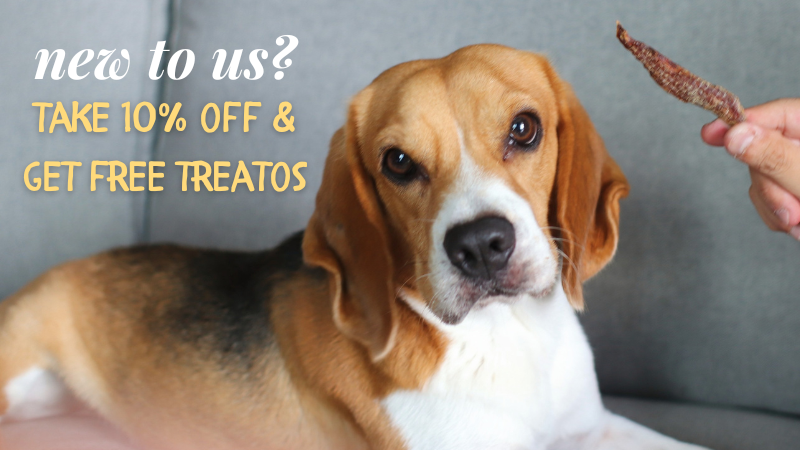
Some common questions we are asked by visitors to our stall at bazaars and markets are these:
- “Are your treats crunchy?”
- “Why are they so hard?”
- “I’m looking for a soft treat”
What we’ve come to understand is that many people want soft, pliable meat treats like those commercially available at pet shops. There is a perception that these soft treats are better for their pets.
It isn’t always the case. Pets, especially dogs, benefit greatly from chewing. Dog teeth are made to rip meat from bone, and their jaws have impressive crushing force. Yes, even chihuahuas! They are literally made to chew and crunch on hard objects! If your dog can crunch on kibble for their meals, they can certainly crunch down on meat treats with no issues.
How are commercial meat treats so soft and plaible?
Answer: Glycerin aka glycerine aka glycerol or various other starches or gums
What is glycerine?
Glycerine is a type of sugar alcohol compound that is made from the by-product of either animal fats, vegetable fats, or synthetically produced. A product labelled ‘vegetable glycerin’ is typically made from soybean, coconut or palm oils. Glycerin from animal fats is typically sourced as a by-product from bovine (beef) or porcine (pork) fats. Glycerin can also be sourced as a by-product of the distillation of biodiesel sources.
It is a colourless, odourless, sweet liquid that is commonly used in food to preserve moisture, and add softness and sweetness. What is basically is, is a humectant, to bind meat together, and keep it moist without spoiling. It is therefore a form of preservative. This is why commercial dog treats can remain in the pet shop for months and years without spoiling, and without hardening.
If you look at some of the packets in store, you may notice that they look ‘wet’ and are soft and bendable.
The other property about glycerine is that it adds bulk to the product and makes it heavier, which means you are actually not getting as much meat in your bag as you think. This allows the manufacturer to offer their products at a lower price, as they aren’t giving you as much meat in your bag.
Contrast this with properly dehydrated meat treats, with no additives, where you get exactly the quantity of product that it says on the bag. By way of example, a 120g bag of Chicken Fillets in our store is made of 540g of raw chicken. That’s half a kilo of raw chicken right in your bag of treats!
-
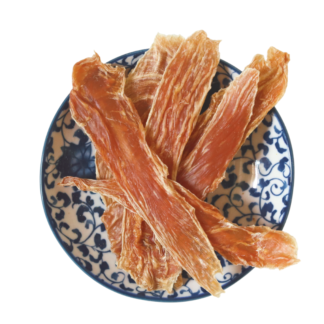 Chicken FilletsRM17.00 – RM30.00
Chicken FilletsRM17.00 – RM30.00
If we were to take the easy way out and add glycerine to the treat, thereby prolonging shelf life but adding weight, you would not get as much value as you presently do.
Are good quality dehydrated treats more expensive? Yes they are. Now you know why – you’re getting more meat for your buck!
Is glycerine bad for your dog?
Glycerin has no nutritional value for dogs and is a sugar alcohol that cannot be fully absorbed by the body. While there are not many studies available on the effect of glycerin for dogs, it is an ingredient that is unnecessary to your dog’s diet.
In the USA, many pet treats that come from China have been recalled for causing harm or even death to pet dogs. Some of them are found to contain harmful glycerin substitutes instead of glycerin. These were not disclosed on the labels.
We did a little survey of pet treats at a large pet shop chain here in Malaysia, and found that there are a large number of dog meat treats that are manufactured in China. These treats are soft and pliable and moist, which indicates that glycerin, or some sort of additive/preservative has been used to keep them this way.
However, what is worrying is that this is not disclosed in the ingredients list, which simply states the meat they use. This leads the customer to believe that what you’re getting is pure chicken meat.
As we produce meat treats ourselves, we know that this soft texture is not possible in a dehydrated or freeze-dried treat, which are 2 methods of natural preservation. In order to keep meats shelf-stable for longer, moisture must be removed to restrict bacteria & mould growth, and this results in crunchy treats, not soft treats.
If a naturally made meat treat is soft, it will spoil within a few days due to the moisture content that keeps it soft. Yet, meat treats in stores remain soft and free of mould for months on end – have you ever wondered why this is so?
It is for this reason that caution should be exercised when buying commercial pet treats from pet shops, because you don’t know what’s really in the treat.
Dehydrated meat treats are crunchy and chewy never soft
Dehydration or air-drying is the process of removing moisture from meats, to allow them to remain fresh and portable for longer. It is a natural method of preservation without adding chemicals or artifical preservatives. The process of removing moisture from the meats will render it crunchy, dry and hard. This is a natural process.
Dehydrated meat treats, like ours, will always be crunchy and chewy, but never soft and pliable. A meat treat that is soft very likely has some form of preservatives added (even if they’re sneaky and do not mention it on the label) and it is often glycerin (if they’re honest) or a substitute (if they are not). Neither ingredient is beneficial to your dog.
To provide for a more chewy treat, we hand-slice all meats into larger and thicker pieces than most. They are easily broken for portion control, but when offered whole, it allows for a delicious, chewy, crunchy treat that most dogs love.
In addition, we tell you on the label exactly what you get in each bag of treats – just meat. Nothing else.
The next time you offer your pet a meat jerky treat, ask yourself if it’s all-natural, or if it’s got preservatives added, and if you’re comfortable feeding that to your dog. If you won’t eat it yourself, the chances are, you shouldn’t be feeding it to your dog either ;)
Check out our 100% natural dehydrated meat treats.
-
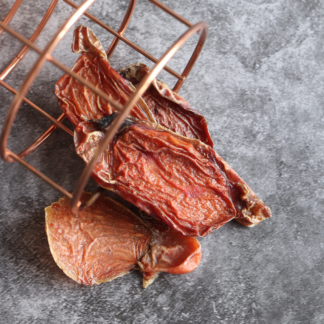 Get the Inside Scoop – Goat TesticlesRM8.00
Get the Inside Scoop – Goat TesticlesRM8.00 -
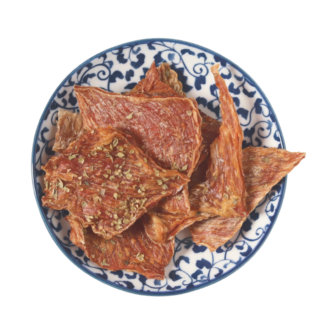 Pork Slices with OreganoRM20.00 – RM37.00
Pork Slices with OreganoRM20.00 – RM37.00 -
 Chicken FilletsRM17.00 – RM30.00
Chicken FilletsRM17.00 – RM30.00 -
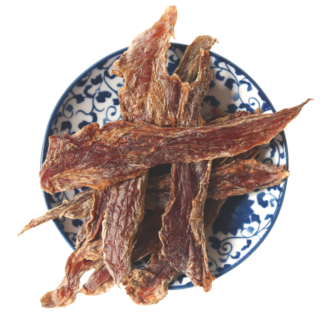 Duck FilletsRM22.00 – RM39.00
Duck FilletsRM22.00 – RM39.00 -
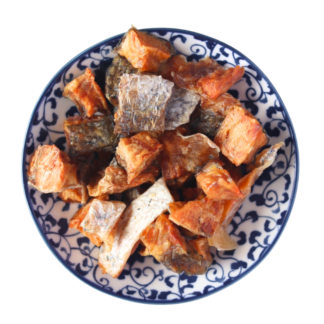 Barramundi ChunksRM28.00 – RM52.00
Barramundi ChunksRM28.00 – RM52.00 -
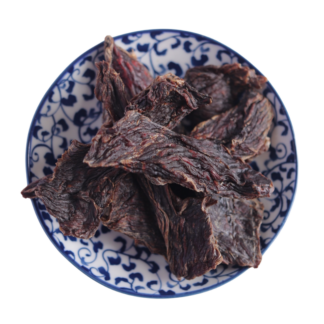 Buffalo SlicesRM19.00 – RM35.00
Buffalo SlicesRM19.00 – RM35.00 -
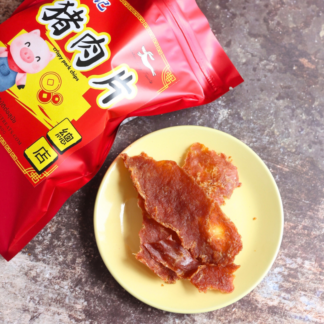 Crispy Pork ChipsRM25.00
Crispy Pork ChipsRM25.00 -
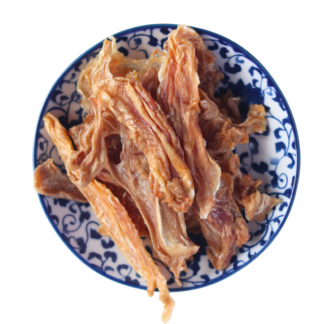 Rabbit ChunksRM39.00 – RM75.00
Rabbit ChunksRM39.00 – RM75.00


